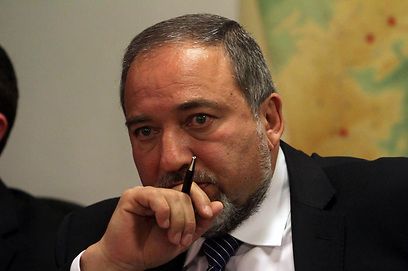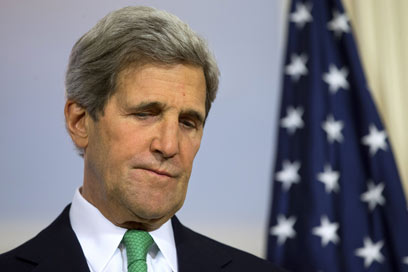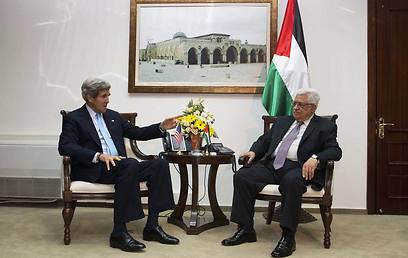
Livni, Lieberman say EU decision would hinder peace efforts
Justice minister meets with EU official, urges to allow sides to set own conditions; Lieberman says EU ban would halt any peace efforts. Kerry returns to region, insists gaps between Israel, Palestinians narrowing
After the EU's decision to ban all contracts with Israel pertaining to the disputed settlement regions, Justice Minister Livni and former foreign minister Lieberman express hope that ban will not take effect, stressing they believe ban could hinder peace talks.
Meanwhile, US Secretary of State John Kerry said on Wednesday that Israelis and Palestinians are getting closer to resuming peace talks and also won Arab League backing for his effort to restart peace talks, raising hopes for a quick resumption in the stalled negotiations.
Related stories:
- PM on EU decision: I will not allow harm to settlers
- Israel in damage control mode after EU decision
- Kerry in Jordan as regional crises mount
Justice Minister Tzipi Livni met Wednesday with the European Union Special Representative for the Middle East Peace Process Andreas Reinicke. In the meeting, Livni stressed that if the EU's decision to ban settlements is not implemented it will expedite the resumption of peace talks.
The former foreign minister added that Europeans would do best if they allowed Israel and the Palestinians to determine their respective conditions for peace through negotiations rather than imposing the EU's conditions on them.

Leiberman: Abbas not interested in peace (Photo: Gil Yochanan)
Avigdor Lieberman also addressed the EU ruling, saying that "If the European Union's intention comes into effect and an official decision to sanction Israeli institutions beyond '67 lines is made, it will blow any chance to renew peace talks, which the Europeans want so badly."
"Such a move indicates to Abu Mazen (Palestinian President Mahmoud Abbas), who is not interested in renewing talks, that he has no reason to return to the negotiation table and that he has every reason to continue to set impossible conditions for its renewal."
Lieberman added that "this move is absurd… because if it is implemented, Israel will under no circumstances agree to reach out to the Palestinians, even once negotiation is renewed."
"Even those on the left, who encourage this move and insist that it is in Israel's best interests, must understand that the only result of unilateral steps such as this will mean the deferment of any agreement for a very long time."
"The EU should focus on Mideast pressing issues, such as Syria, Egypt, Iraq and Iran, instead of causing a stir in the only place that even when faced with conflict, handles it reasonably and with hardly any violence, thanks to the responsible conduct of the only democracy in the region.
Kerry's mission
Kerry, on his sixth trip to the Middle East in as many months as America's top diplomat, met in Jordan with representatives of the Arab League and nine of its members that support a comprehensive Arab-Israeli peace plan proposed by Saudi Arabia.
"Through hard and deliberate work, we have been able to narrow those gaps very significantly," Kerry told a press conference with Jordanian Foreign Minister Nasser Judeh.

Kerry 'hopeful' about peace (Photo: AP)
"We continue to get closer and I continue to be hopeful that the two sides will come to sit at the same table," he added, after talks in Jordan with Palestinian president Mahmoud Abbas and Arab envoys.
Kerry, who spent hours locked in marathon meetings with both Abbas and Israeli Prime Minister Benjamin Netanyahu on his last visit late last month, declined to go into details on the substance of the talks.
"There is still some language that needs to be worked out," he said.
"I would caution everybody to resist the temptation to speculate. The easiest bet has always been on predicting impasse."
Kerry refused to discuss details of the proposals he laid out to the Arab officials or how the gap with the Israelis had narrowed.

Kerry, Abbas (Archive photo: Reuters)
In a statement after the meeting with Kerry, Arab delegates said they supported Kerry's initiative.
"The Arab delegates believe Kerry's ideas proposed to the committee today constitute a good ground and suitable environment for restarting the negotiations, especially the new and important political, economic and security elements," the statement said.
A more muted response came from Palestinian negotiator Mohammed Ishtayeh, who said Palestinian leader Mahmoud Abbas will be holding a meeting of the PLO leadership to discuss Kerry's ideas.
"We are keen to see Kerry's efforts work, but so far there are no promising signs from the Israeli side," Ishtayeh said.
In addition to the peace process, Kerry was updating the Arabs on US support for the Syrian opposition and attempts to convene an international conference to establish a transition government there, as well as Washington's position on Egypt's political turmoil.
The gathering came a day after Kerry had a five-hour dinner meeting in Amman with Abbas. Officials said Kerry and Abbas discussed the way forward and projects aimed at bolstering the Palestinian economy. No further details were available, and Kerry and Abbas met again on Wednesday.
It remained unclear whether Kerry would meet Israeli Prime Minister Benjamin Netanyahu or any of his top aides on his trip. Israel is not currently on Kerry's itinerary, although officials said that could change.
Abbas has refused to negotiate unless Israel halts all construction in West Bank settlements. Israel has refused, saying negotiations should resume without conditions. Kerry has offered the Palestinians a package of economic incentives to restart the talks.
Kerry has spent hours with Abbas and Netanyahu trying to set the stage for a return to peace talks that foundered and collapsed in 2008. Kerry insists progress has been made but there have been few, if any, discernible signs that the two sides are getting closer to agreeing to discuss the major issues that divide them.
Kerry said Tuesday after talks with Judeh that he wanted to see a Syrian refugee camp, and it appeared likely that if such a visit is arranged, it would happen Thursday before he is scheduled to return to the United States. Judeh said Kerry had expressed concern about the economic impact the humanitarian crisis in Syria has had in Jordan, which hosts more than a half million displaced Syrians.
Should the visit materialize, it would be the first by an Obama administration Cabinet-level figure to Syrian refugees, some of whom have complained about a lack of US support. Syrian rebels have also complained that they are not receiving promised military assistance from Washington.
Moran Azulay, AFP and the Associated Press contributed to this report
- Receive Ynetnews updates directly to your desktop










